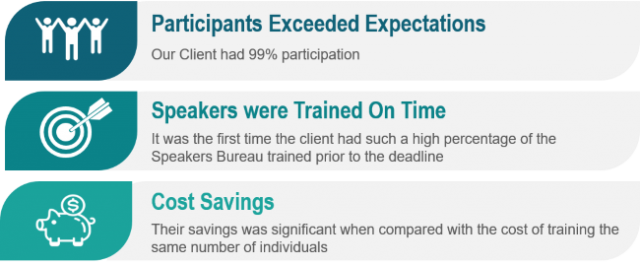Speakers provide one of the most promising methods of influencing prescribers. They are typically clinicians who have experience with a product and, coupled with their scientific training, have the know-how to determine how to guide their colleagues who may have less experience with the product. Peer-to-peer works. This is why companies spend hundreds of millions of dollars annually on speaker programs. Truly developing speakers with impact, while minimizing costs, is the holy grail of medical education. In this article, I discuss the tools that will help many of you achieve these 2 goals. When you achieve these goals, education is improved between health care professionals (HCPs) which leads to the use of newer pharmaceutical or biological therapy options for patients.

Let me share a case study that has evolved within our speaker education for our clients. This is a story about a client who understands that speakers are influenced by both pragmatic and social influences. Their dedication and commitment to speaker programs is unwavering, so training these scientists is paramount. Why? Well, training keeps contracted speakers informed on the latest data—the good, the bad, and the ugly. A forum needs to be held for these consultants to engage with scientists who are on the forefront of the research and clinical trials, as well as the commercial decisions. Also, compliance is a key driver in an ethical pharmaceutical company; even doctors need to be reminded of the rules which we need to abide by in our new era of medical education.
Speaker training can lead to better speakers because better speakers don’t just recite information—they tell stories. Think about the wild success of Ted.com. Stories resonate and they sell products. That’s why the more first-nature the scientific insight becomes, the more likely the speaker will tell a story rather than recite content on a slide. Stories have meaning.
Companies need to have a commitment to train speakers with this knowledge and this particular client has made live training mandatory. This year, it was just plain difficult for physicians to attend a weekend of live training due to personal and professional commitments—and the weather precluded many from participating. This client has rules and, honorably, is committed to following their rules; however, over 100 speakers couldn’t attend this year. According to those rules, these HCPs would have to be removed from their bureau—not customer friendly.
Our client came to us with this problem and needed us to provide a virtual solution. They had specific requirements for us to consider:
- White-glove service for this elite group of local, regional, and national advocates
- A one-stop-shop to handle all invitations, set up reminders, and handle phone requests
- Delivery of a custom registration site
- Implementation of a cutting-edge technical platform that would require no downloading, plugins, or technical challenges for a group of individuals never having taken an Information Systems course
- Managing all program details as they wanted assurance that we would take care of all program development and planning details
- Strict management of participants during program timeframes
After the Vision2Voice team reviewed the list of client requirements, an internal action plan was created. The team decided to take our existing tools and deliver them in a way that would be perfectly suited for the needs of this particular client.
First, we knew that flawless execution was an expectation, so our general manager proposed a series of web events that were hosted out of one central command center. Our entire Vision2Voice team was together in our Chicago office to ensure high control of all program management details—none of our staff was virtual. This allowed for unified testing on all platforms, including iOS, Windows, and Android. The only individuals who would be virtual, were those participating from the client side.
Second, we needed hours of preparation to train the trainers. The faculty learned our technology platform in advance as did the client. Everyone would need to be prepared and ready to hit the ground running with the initiation of the first program. There is no substitution for preparedness in an age when unanticipated “issues” can happen.
Third, because of the importance of training, a large number of live web events were hosted, with many time zone options to accommodate different personal situations and work schedules. They needed interactivity so our senior director of client services built that into the process in a way that would meet and exceed the client’s requirements. We agreed on the value of interactivity. If speakers didn’t respond during polling, they wouldn’t get certified, and would have to attend another program. Attendees interacting and demonstrating that they were learning and were committed to the new information was an important objective.
The results were astounding.
Due to Vision2Voice’s commitment to a central command center approach and our client’s willingness to fully prepare the speakers, the results of these training programs were measurably excellent. There were zero calls into our tech support line. If individuals were dropped off due to their local Internet Service Provider Issues, they were reconnected without delay.

What really made this training method astounding was the following:
From my vantage point, a commitment to speaker training provides so many advantages for an organization. Teach well and speakers will act with integrity and tell a meaningful story that resonates with an audience. A creative approach like virtual training adds to the overall integrity of effective speaker training. When done right, effective speaker training will lead to better education and ultimately, improved care for patients—high speaker participation rates, meeting project deadlines, and saving money aren’t too bad added bonuses either!





